Trump uses more 'realistic' tone in coronavirus briefing, but repeats false claims: FACT CHECK
He changed his take on masks and bars, but still gave a rosy outlook.
President Donald Trump's return to the briefing room podium for his first coronavirus focused news conference in nearly three months has been described as somber, serious and realistic -- a change in tone.
But while less defensive than he's been in past briefings, he continued to repeat some of the same dubious claims he made in the earliest days of the pandemic.
When he read from his prepared remarks he offered a rare acknowledgment that the virus "will probably get worse before it gets better."
Yet later, when he went off-script, he once again made one of his most criticized claims -- arguing with no scientific basis that "the virus will disappear."
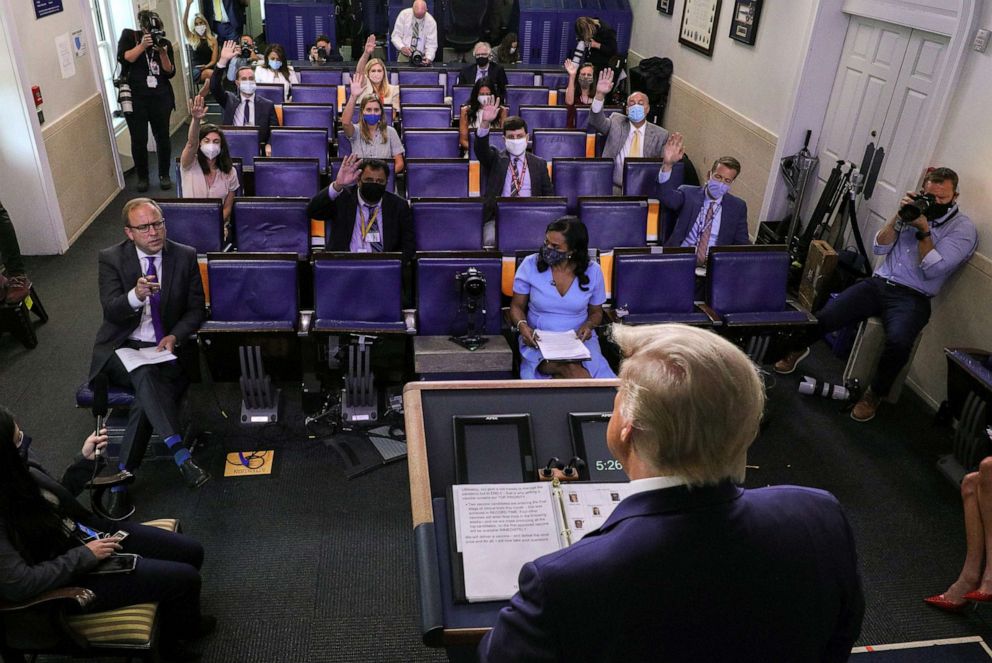
Overall, although Trump painted a more accurate picture of the pandemic than he has in the past -- conceding some of the "embers," as he had previously called outbreaks, had turned into "big flames" -- he still offered a rosy outlook.
It's also unclear if anything will change in his administration's much-criticized response, which he kept praising.
Here are the facts:
Claim: Governors have 'everything they need' and his administration has 'zero unfulfilled requests'
In an attempt to downplay any failure by the federal government's handling of the escalating crisis, Trump claimed that all state executives have what they need -- thanks to him.
"The governors are working very, very hard, and we are supporting them 100%. Everything they need they get, and we are taking good care. We have tremendous supplies and a great supply chain, whether it's ventilators or gowns or just about anything they need," he said.
"My administration currently has zero unfulfilled requests for equipment or anything else that they need from the governors. No governor needs anything right now and we think we'll have it that way until the end because frankly we are stocked up and ready to go," he continued.
But multiple governors asked Vice President Mike Pence in a call on Monday for more personnel and testing equipment, according to PBS, as strained hospitals are still reporting shortages.
The AP also reported the U.S. is again running low on personal protective equipment for frontline workers.
And according to the New York Times, Republican governors have been holding phone calls among themselves to trade ideas and share grievances.
At least one Republican governor, Asa Hutchinson of Arkansas, hours before Trump's briefing, reported a state record for COVID-19 hospitalizations, saying its caseload has the potential to strain hospital staff and resources.
Several governors have also expressed the need for more resources to help schools open up safely. Notably, the School Superintendents Association has estimated necessary protective measures to keep schools safe this fall would cost an average of about $1.8 million per school district.
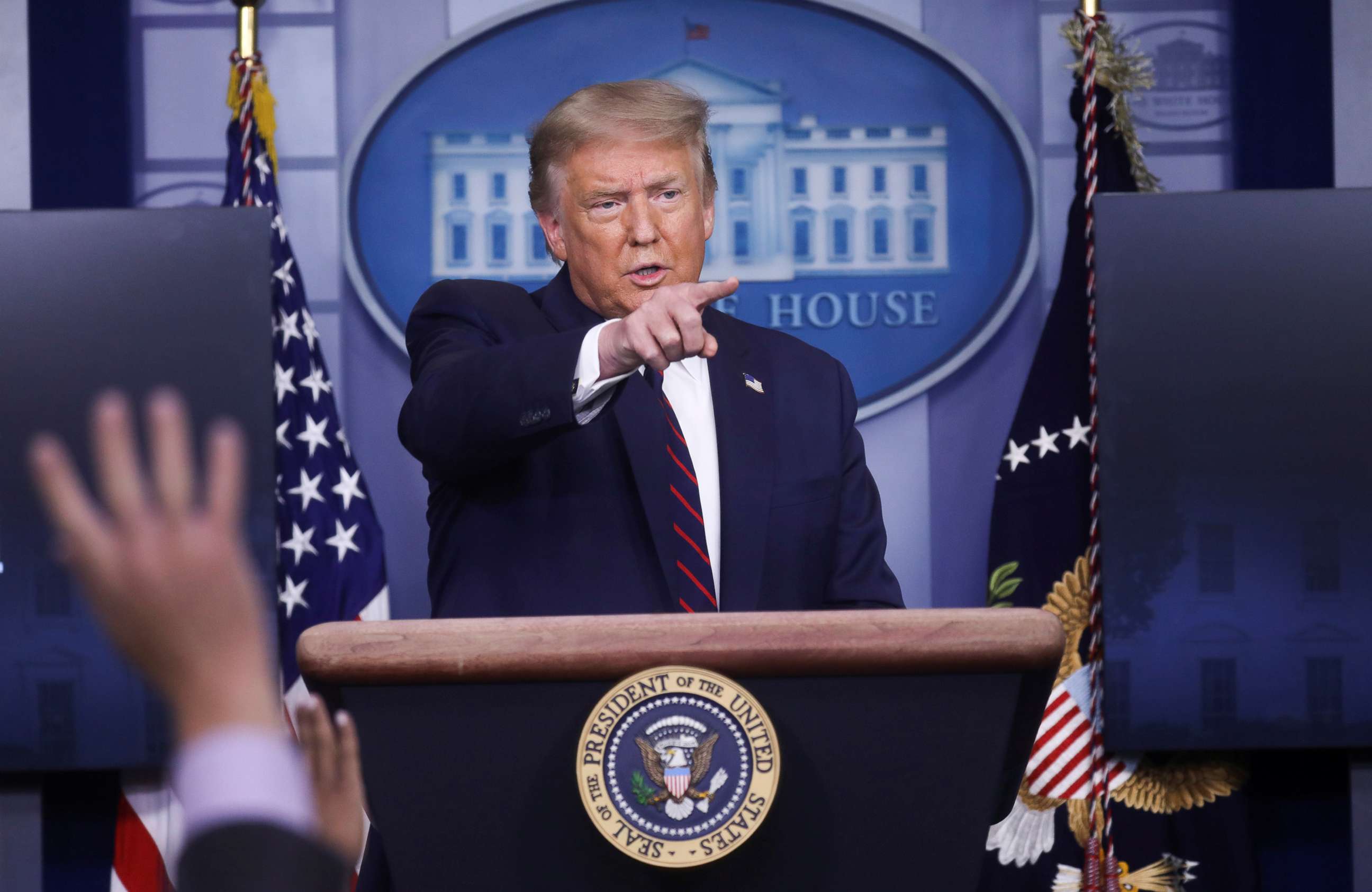
Claim: Trump said he's been seen wearing a mask 'a number of times'
Displaying a mask in his hand -- but not putting it on -- Trump pulled an about-face on masks more than three months after the Centers for Disease Control and Prevention recommended the practice for all Americans.
"I view it this way: anything that potentially can help, and that's certainly can potentially help, is a good thing. I have no problem. I carry it. I wear it. You saw me wearing it a number of times, and I'll continue," he said.
But the president has donned a mask only once in public -- at Walter Reed National Military Medical Center a few weeks ago -- saying it was an "appropriate" setting to wear one. He said he wore one while touring a General Motors facility in Michigan in May, but he purposefully didn't wear it in front on reporters, saying he didn't "want to give the press the pleasure of seeing it."
When he first announced the CDC recommendation, he stressed it was "voluntary" and he didn't see it for himself.
Trump's urging Americans to mask up came one day after he tweeted a photo from what appeared to be his Walter Reed visit and called the practice "patriotic" -- a term he repeated Tuesday.
Only now is he claiming to have adopted the idea of wearing masks -- and he tried to change that perception that he's reversed course, if he actually wears one again in public.
Claim: The US has 'done much better than most'
Trump repeatedly tried to make it seem as if the U.S. did not stand out in the seriousness of its crisis compared to the rest of the world -- when in fact, the situation is much worse in the U.S. than in most other countries, by several different metrics.
"If you watch American television, you'd think that the United States was the only country involved with and suffering from the China virus. Well, the world is suffering very badly. But the fact is that many countries are suffering very, very, very badly, and they've been suffering from this virus for a long time," he said. "We've done much better than most and with the fatality rate at a lower rate than most."
The facts show the U.S. has the worst documented coronavirus outbreak, reporting more than 50,000 news cases a day and nearly 145,000 cumulative deaths since the pandemic began.
On Tuesday alone there were over 1,000 reported coronavirus deaths today for the first time in two weeks, according to Johns Hopkins University.
By comparison, Germany and Japan, albeit far smaller countries, are reporting hundreds of new cases a day, not tens of thousands.
Meanwhile, New Zealand, which took stringent lockdown measures as soon as the virus landed, has seen a successful reopening.
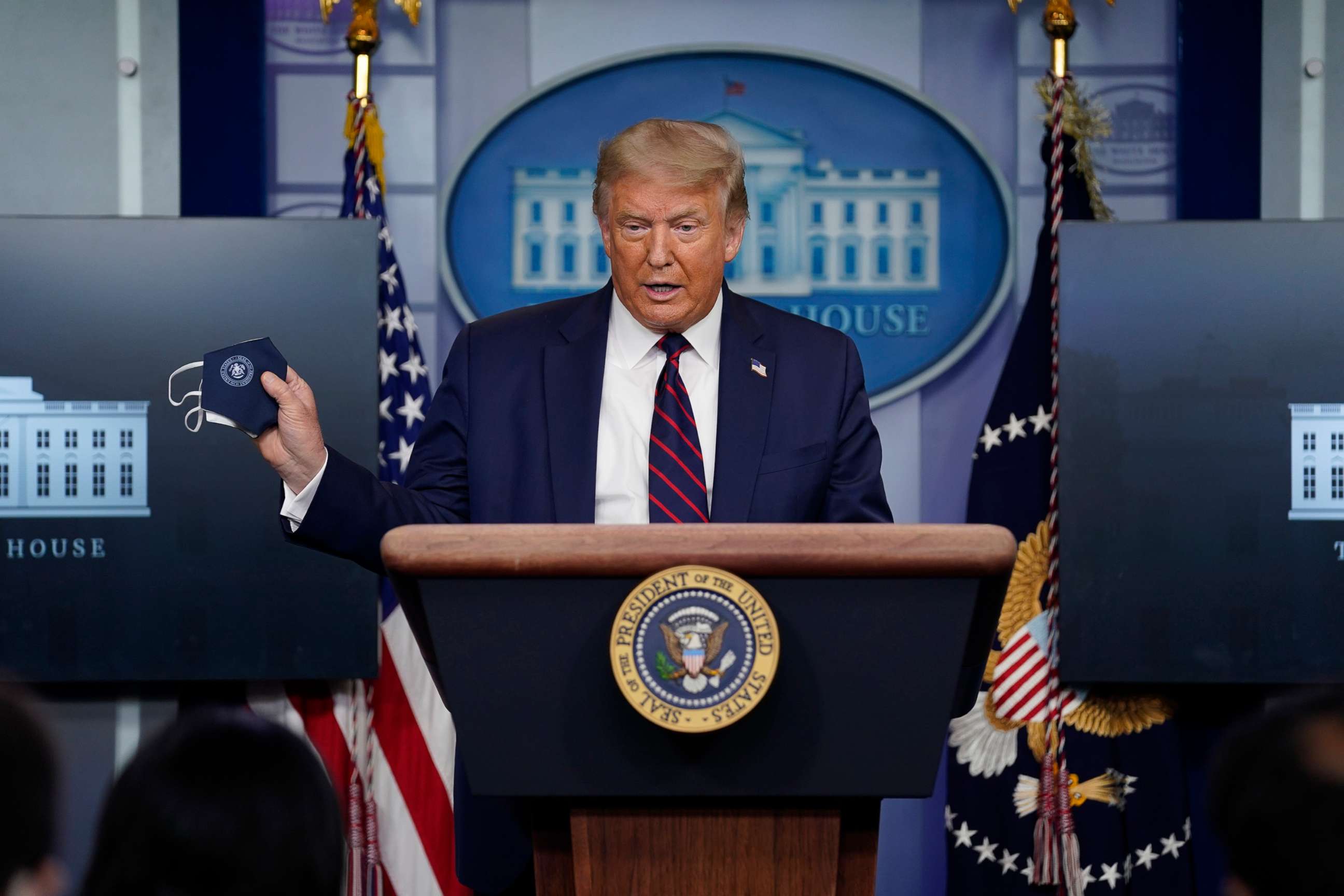
Claim: The US case fatality rate is lower than 'almost everywhere else in the world'
Trump downplayed the country's fatality rate by emphasizing the ratio between confirmed deaths and confirmed cases -- known as the case fatality rate -- as opposed to the straight mortality rate.
"Our case fatality rate has continued to decline and is lower than the European Union and almost everywhere else in the world," he said.
A case-fatality rate equals the number of deaths from COVID-19 relative to the number of confirmed COVID-19 cases, shown as a percentage. While this has fallen, it isn't lower than "almost everywhere else in the world."
In fact, more countries have lower rates compared to the U.S. than those with higher rates.
Flanked by two misleading charts showing case-fatality rates, Trump made it appear the U.S. is in a much better place relative to other countries -- but the charts listed only those countries with higher rates than the U.S.
Notably, if the U.S. conducted more tests, its case-fatality rate would drop lower, since more asymptomatic cases and those with less severe symptoms not currently caught to a large degree by testing in the U.S. would drive up the denominator.
Though Trump failed to mention it, according to Johns Hopkins University data, the U.S. mortality rate per capita ranks third-highest worldwide.
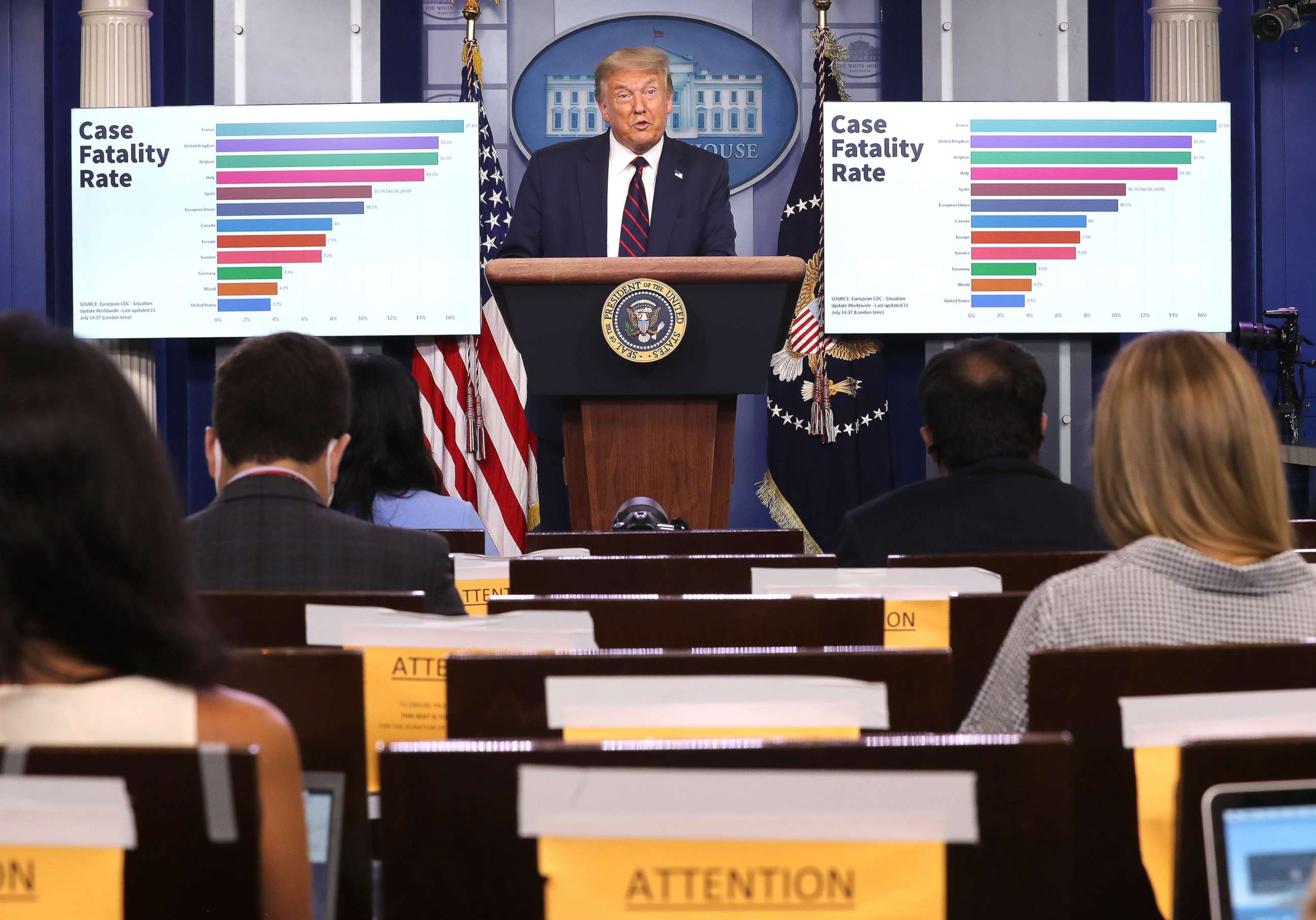
Claim: Obama left 'very, very empty cupboards'
Trump has blamed the Obama administration multiple times since COVID-19 hit U.S. soil, but his claim is misleading.
"So, that's a big difference from inheriting very, very empty cupboards," Trump said, after his claim that everything governors need, they can get.
While the stockpile of personal protective equipment, for example, was depleted and not replenished by the Obama administration -- the cupboards were not left "empty." Trump inherited significant quantities of other supplies, according to the Poynter Institute. Critics note the Trump administration had three years in office to replenish stockpiles.
Notably, Trump in 2018 disbanded the Obama administration's National Security Council directorate for global health and security and bio-defense, which oversaw preparation for future pandemics.
And despite bipartisan calls, the Trump administration has not fully utilized the powers of the Defense Production Act to spur manufacturing of essential supplies like personal protective equipment.
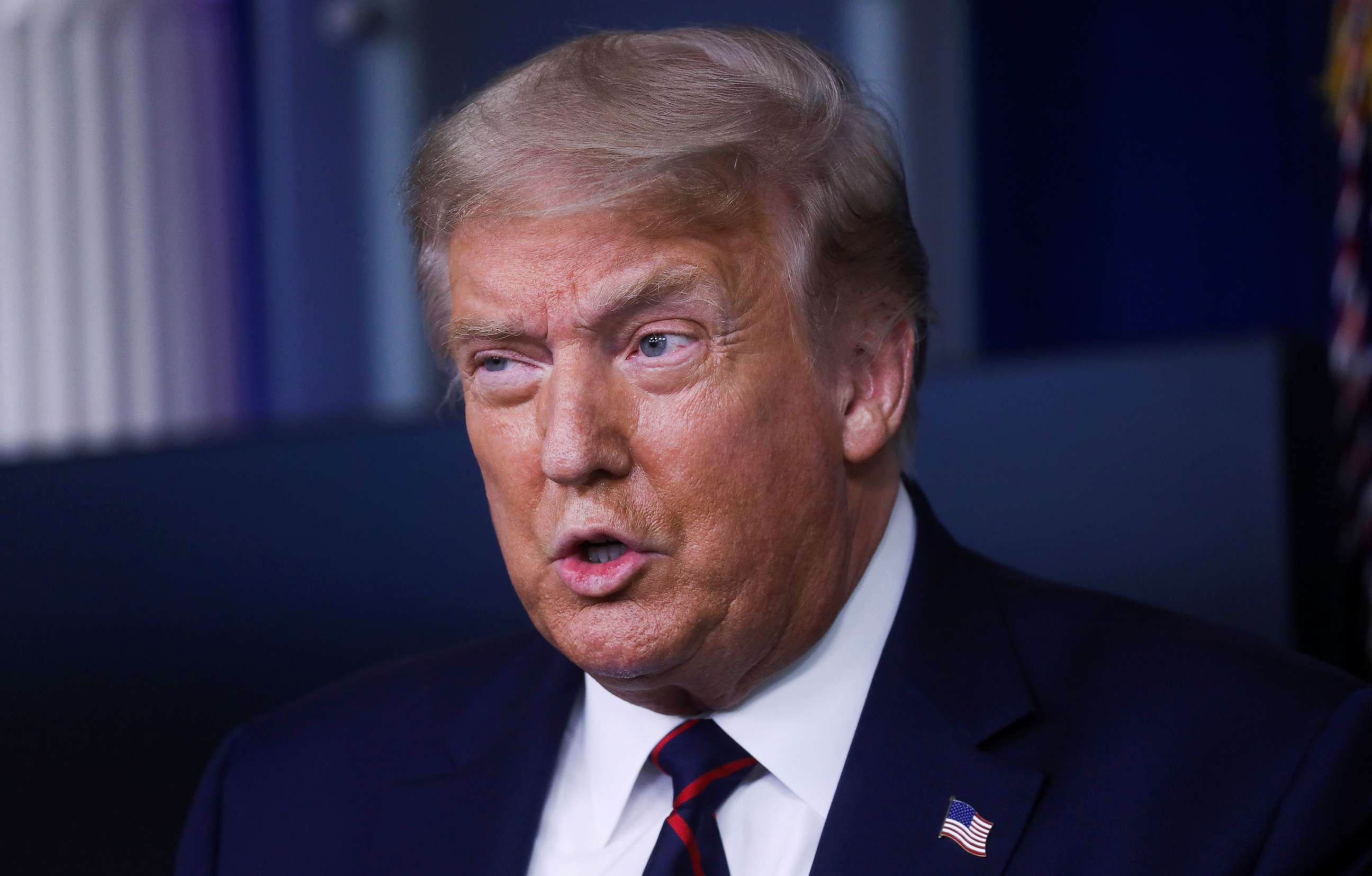
Claim: Trump says he's open to additional funding for testing
Questioned by ABC News Chief White House Correspondent Jonathan Karl about whether the U.S. has a problem with testing, the president defended the state of testing in the United States, saying "we've done more testing by far than anybody."
Though the U.S. has now completed more tests, it lagged behind countries like South Korea in getting those systems in palace and still lags in wait times.
Karl followed up on whether he approves of additional funding for testing.
"Well they're going to make a presentation to me tonight and tomorrow on that," Trump said. "I think that we are doing a tremendous amount of testing but if the doctors and the professional feel that even though we're at a level that nobody ever dreamt possible that they would like to more, I'm okay with it."
Perhaps Trump has changed his views and does want to prioritize testing after weeks of suggesting more testing makes the country look bad -- but his comment comes in the same week as his administration has sought to zero out any additional funding for testing in the next round of relief funding.
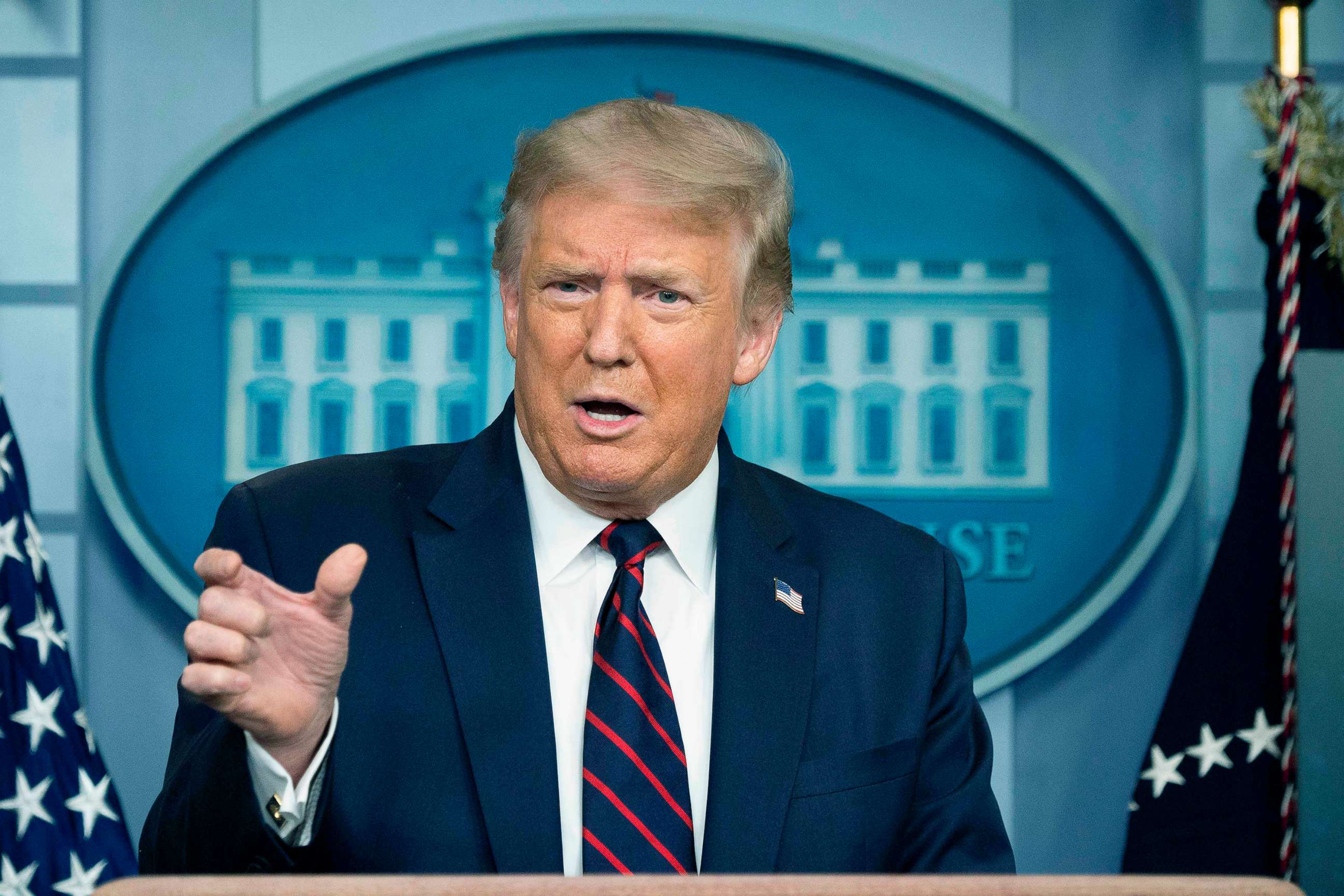
Claim: 'Well the virus will disappear. It will disappear.'
While the president opened the 26-minute news conference acknowledging the situation "will probably, unfortunately, get worse before it gets better," it didn't take long for him to deviate from his script when taking questions.
"Well, the virus will disappear. It will disappear," he said, when asked if he is responsible for Americans dying. "I could say I'm fully responsible but …" he continued, again pointing to his decisions to order partial travel bans on China and parts of Europe.
But here is no evidence to suggest the virus will disappear.
The director of the National Institute of Allergies and Infectious Diseases, Dr. Anthony Fauci, said while he sees a future where the virus is under control, he doesn't see complete eradication as the president has pushed.
"I don't see this disappearing the way SARS one did. The reason I say that is that it is so efficient in its ability to transmit from human to human," he said Wednesday on a webinar hosted by the TB alliance. "I think we ultimately will get control of it. I don't really see us eradicating it."
Director of the National Institutes of Health, Francis Collins, also told ABC's Bob Woodruff in an interview on Monday, "I don't think that this particular virus is going to disappear from the planet."
ABC News' Ben Gittleson and Jordyn Phelps contributed to this report.



